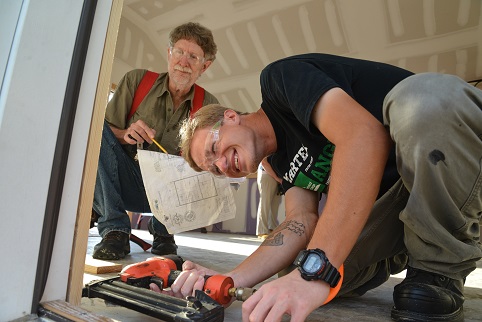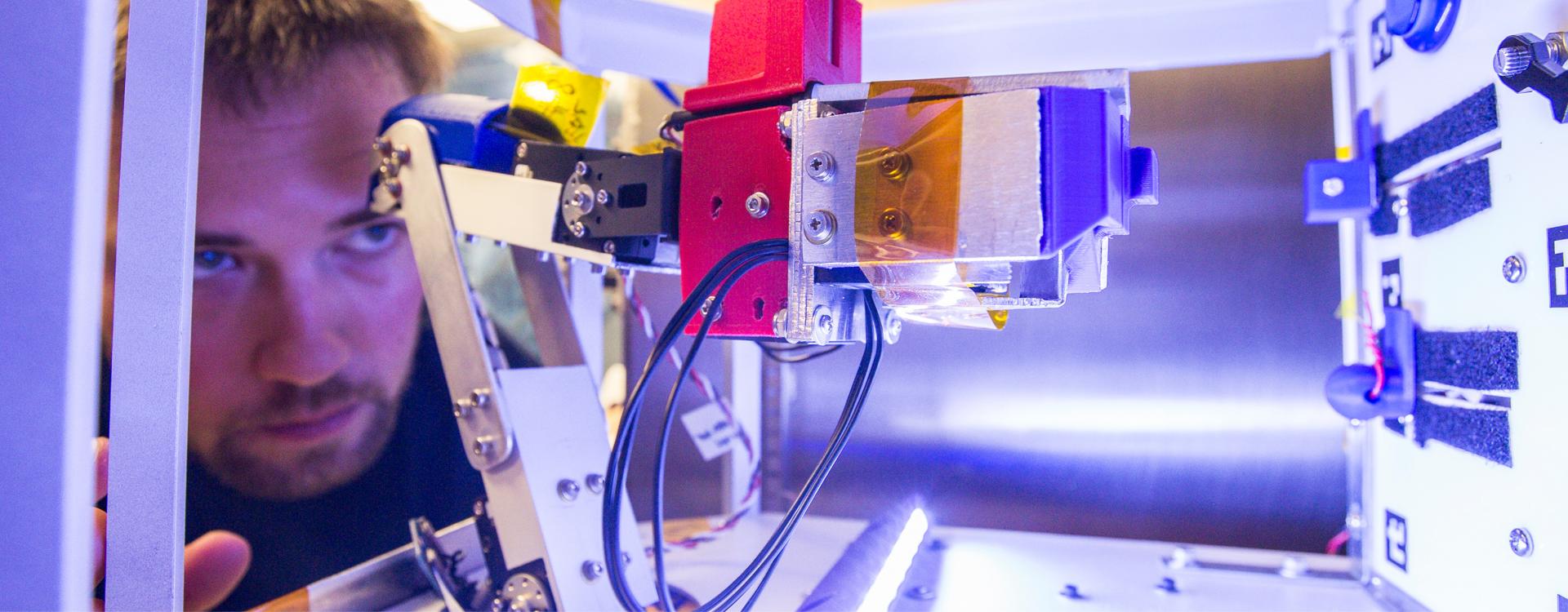From the ground up: Durham Tech students build tiny house for Habitat family
 The bangs and pops and zips of construction equipment seemed to echo off the spanning Durham Tech parking lot on a nearly empty Saturday morning in January.
The bangs and pops and zips of construction equipment seemed to echo off the spanning Durham Tech parking lot on a nearly empty Saturday morning in January.
A miniature house protruded from the asphalt with 12 Durham Tech students clinging to the angles and sides.
In six-hour shifts every Saturday for four semesters, students hammered, nailed, and caulked their way to build a one bedroom tiny home to be donated to Habitat for Humanity of Durham to serve someone in need.
“It’s really awesome to know this house will impact someone’s life,” said Donna Bauer, a Durham Tech student. “It was great to see the whole process from the ground up. This experience has given me so much confidence and knowledge.”
The tiny house project was funded by a grant from the Bank of America Foundation in May 2016 to contribute to Habitat’s tiny house initiative, while also providing a learning experience for Durham Tech students.
Maryah Smith-Overton, Director of the Construction Trades program at Durham Tech, said the project also addresses Durham’s affordable housing crisis.
“This is the only opportunity that students have to build from the ground up, and that’s been really valuable,” Smith-Overton said. “It’s not only impacting someone’s life, but because it’s collaborative with Habitat it’s providing affordable housing to someone in Durham, which is crucial at this time.”
With a multi-phased project, Smith-Overton said she gets to teach a variety of skills and trades, and students have an opportunity to see the interaction. On the tiny house, she said, students in the Electrical Systems Technology program helped install the electrical work.
“The project started with people who had never used a circular saw and now leaving with so many new skills,” Smith-Overton said. “This has been such great experience. I would start another one tomorrow if I could.”
Kelley Massengale, another Durham Tech student who worked on the project, said she enrolled in the course to learn basic carpentry, but found the community impact side even more rewarding.
“I wanted to learn carpentry skills to do projects in my own house, and this provided an opportunity to not only learn, but to help someone in the community,” said Kelley Massengale. “It’s exciting to know we’re playing a part in improving someone’s life.”
Durham Tech President Bill Ingram said the grant-funded project provides a unique experience for students to receive a variety of skills while impacting the community.
“We are grateful for the support and generosity of Bank of America in providing our students with this distinctive learning opportunity to build a tiny house,” Dr. Ingram said. “These initiatives allow our students to both develop essential workplace skills and give back to the community through Habitat for Humanity.”
The house is scheduled to be moved to a community of similarly styled homes in Durham this year.
For Smith-Overton, the tiny house project is a first step in a larger campaign for increased construction trades programs at Durham Tech. Along with machining, welding, and industrial trades degrees offered at the College, she hopes to build a larger skilled trades department that packages needed credentials for a booming construction industry in the Triangle.
One way she hopes to do that is through apprenticeship programs.
“The tiny house build and our apprenticeship programs give students the experience of building from the ground up, moving between the classroom and hands-on building projects throughout training,” Smith-Overman said. “Apprentices are applying what they’ve learned to the on-the-job component of the apprenticeship program, which runs anywhere from two to four years.”
As the construction industry soars in Durham and Orange counties, Smith-Overman said she’s working to keep up with the needs.
“My vision for the future of construction trades at Durham Tech is to continue to expand programming in the trades, while providing more work-based learning opportunities for students so they can meet local employers and find long-term employment,” she said. “We’ll work to provide our students skills and training to take part in the growth that is happening all around us.”

